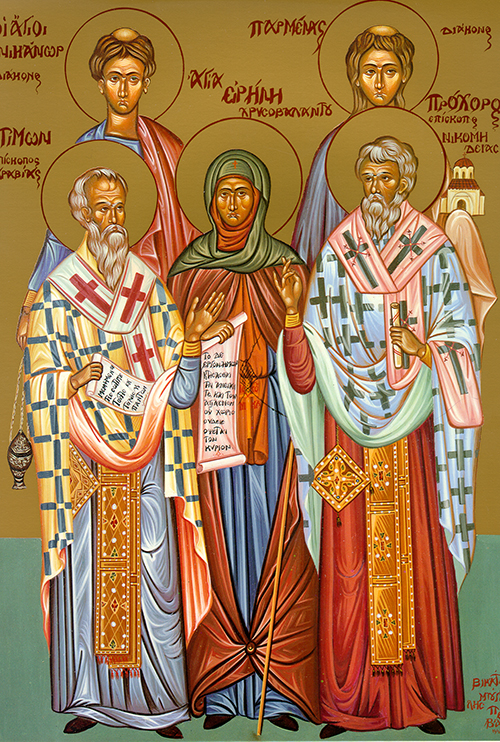

The holy apostles and deacons Prochorus, Nicanor, Timon, and Parmenas were of the seven chosen to be deacons in Acts 6:1 ff. and are described as “full of the Holy Spirit and wisdom.” The congregation of the disciples chose them, and the Apostles laid their hands on them, that they might minister in service of the needy. St. Prochorus accompanied the holy Apostle Peter, who made him bishop in the city of Nicomedia. After the Dormition of the Theotokos, Prochorus was a companion and coworker of the holy Apostle John the Theologian and was banished with him to the island of Patmos. There he wrote down the Book or Revelation concerning the final fate of the world. Upon returning to Nicomedia, St. Prochorus converted pagans to Christ in the city of Antioch, where he suffered martyrdom. St. Nicanor suffered the same day that the holy Protomartyr Stephen and many other Christians were killed by stoning. St. Timon was later appointed by the Apostles as bishop of the city of Bostra in Arabia and suffered from the Jews and pagans for preaching the Gospel. He was thrown into a furnace, but by the power of God he came out unharmed. The tradition of the Roman Church says that St.Timon died by crucifixion. St. Parmenas zealously preached Christ in Macedonia. He died after being afflicted with an illness. Some say that St. Parmenas suffered martyrdom under Trajan (98-117) in the final year of his reign.
O holy apostles, intercede with the all-merciful God, that He may grant us forgiveness for our sins.
You were deacons and eye-witnesses of the Word, chosen vessels of the faith and glorious saints. Today we take up the celebration of your memory and glorify you with a light and happy heart.
1 Corinthians 14: 26-40
Brothers and sisters: When you assemble, one has a psalm, another some instruction to give, still another a revelation to share; one speaks in a tongue, another interprets. All well and good, so long as everything is done with a constructive purpose. If any are going to talk in tongues let it be at most two or three, each in turn, with another to interpret what they are saying. But if there is no one to interpret, there should be silence in the assembly, each one speaking only to himself and to God. Let no more than two or three prophets speak, and let the rest judge the worth of what they say. If another, sitting by, should happen to receive a revelation, the first ones should then keep quiet. You can all speak your prophecies, but one by one, so that all may be instructed and encouraged. The spirits of the prophets are under their prophets’ control, since God is a God, not of confusion, but of peace.
According to the rule observed in all the assemblies of believers, women should keep silent in such gatherings. They may not speak. Rather, as the law states, submissiveness is indicated for them. If they want to learn anything, they should ask their husbands at home. It is a disgrace when a woman speaks in the assembly. Did the preaching of God’s word originate with you? Are you the only ones to whom it has come?
If anyone thinks he is a prophet or a man of the Spirit, he should know what I have written you is the Lord’s commandment. If anyone ignores it, he in turn should be ignored. Set your hearts on prophecy, my brethren, and do not forbid those who speak in tongues, but make sure that everything is done properly and in order.
Matthew 21: 12-14, 17-20
At that time, Jesus entered the temple precincts and drove out all those engaged there in buying and selling. He overturned the money-changers’ tables and the stalls of the dove-sellers, saying to them: “Scripture has it, ‘My house shall be called a house of prayer,’ but you are turning it into a den of thieves.”
The blind and the lame came to him inside the temple area and he cured them.
With that, Jesus left them and went out of the city to Bethany, where he spent the night. At dawn, as Jesus was returning to the city, he felt hungry. Seeing a fig tree by the roadside he went over to it, but found nothing there except leaves. He said to it, “Never again shall you produce fruit!”; and it withered up instantly.
The disciples were dumbfounded when they saw this. They asked, “Why did the fig tree wither up so quickly?”
Icon courtesy of Jack Figel, Eastern Christian Publications – ecpubs.com
Thursday, July 27 –